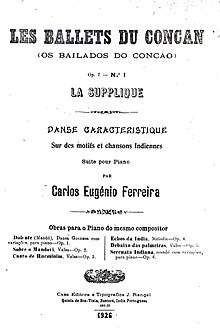Deknni
Dekhṇi (also spelled Dekni, Dekni, Dekhṇi) is a semi classical Goan (Indian) dance form. The plural of dekṇi in Konkani remains the same.
Overview
One of the earliest deknnis which may be dated around 1869 is Kuxttoba in which he is called “heir to India and terror of Goa”, implying resistance to Portuguese rule. Kuxttoba was a member of the Salekar branch of the Rane family. Information about his birth, the reason and the course of his rebellion and the manner of his end are vague. He did rebel as an individual against the rule of the Portuguese in Goa but he presented no concept for a free Goa.

One of the most famous Deknni songs is Hanv Saiba Poltodi Vetam by Carlos Eugenio Ferreira (1860–1932) first published in Paris in 1895 and then in Goa in 1926 by Tipografia Rangel. The song was adapted by Raj Kapoor as Na mangoon sona chandi in his Hindi movie Bobby.[1] The story that is depicted in this song is about two temple dancers who want to go for Damu's wedding and they approach the boatman to ferry them across the river. The boatman says, "No! The river is rough!" The dancers offer the boatman their gold jewellery; but the boatman is still firm. "No!" he says. So the dancers dance for the boatman and this time he ferries them across the river.
| Hanv Saiba Poltoddi Vetam (I'm Crossing to the Other Side of the River) | |
|---|---|
| Konkani lyrics | Translation |
| First stanza | |
|
Hanv Saiba Poltoddi Vetam, |
Oh, to the other side I'm crossing, |
| Second stanza | |
|
Damulea matt(u) vant(u), |
In the tent of Damu's wedding |
| Refrain | |
| Ghe, Ghe, Ghe (Take it, Sir!) | |
| Konkani lyrics | Translation |
|
Ghe, ghe, ghe, ghe, ghe, ghe ga saiba, |
Take it, take, take, take, oh!, |
| Source: Dekknni by Carlos Eugenio Ferreira (1860–1926) taken from the Greatest Konkani Song Hits Vol. 1 (2009)[1] | |
Other deknni songs are:
- Arê tanddela
- Tendulechim tendulim
- Vaingem kazar zata mhunn
- Voddekara
- Vhoir vhoir dongrar
- Xeutim mogrim abolim
Citations
- Rodrigues 2009, pp. 111–112
References
- Rodrigues, Francis (2009), Greatest Konkani Song Hits Vol. 1, Toronto: Pater Publications, ISBN 978-0-9811794-0-7, retrieved 2010-02-19